Erstellt am: 18. 10. 2014 - 05:05 Uhr
Tuica, Scythes and Eggs of Hay
When Romanian farmer Ion Ungareanu picked me up in his clapped out Dacia car he seemed amused but befuddled. Why had I wanted to stay in the community of Costesti in rural Romania? Why had I travelled so far to learn to use a scythe and to milk by hand?
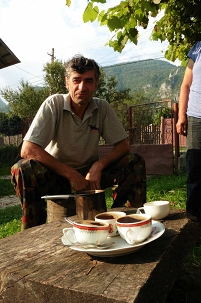
Chris Cummins
My Romanian was not up to long explanations, but, as we shared a welcoming tipple of his homemade plum brandy in the shade opposite his latticed hayloft, I had wanted to explain it like this:
I had wanted to come to a land where wild-flowers still steam in the meadows, bees thrive, where there is still a broad natural profusion of seed varieties and the biology of soil means you can still work with nature rather than fighting against it with injections of nitrogen oxide.
I wanted to see if there was a chance for a rural future that lives in symbiosis with nature, rather than waging a chemical war against it in an obsessive quest for ever greater production?
A Question of Values - A Question of Balance
This is a story of the sort of Europe we want. Do we want a continent of diversity? A continent that cherishes the variety of culture practiced by its people, the variety of seeds that are grown in its earth, the variety of flowers that grow in its meadows, the variety of trees that grow in the forests and the variety of animals that shelter in them. Do we want a Europe where pockets of the countryside are still alive with the sound of human activity?
Or do we want a continent completely dominated by biotech companies and agribusiness where a few seed varieties remain and where people like Ion Ungareanu have been out-priced, denigrated and encouraged to sell of their land?
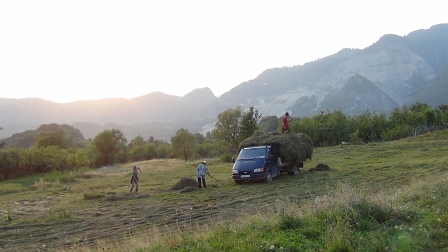
Chris Cummins
There is a battle raging in Romania - an important battle that has often been neglected by Europe's media. It's a battle about progress but it is a battle about community choice. It is about rural people being allowed to choose their own interpretation of what progress means, rather than being shamed into abandoning their values by politicians in the capital. It is about respect for the small-scale, soft-impact farmers that have enriched Romania's culture and protected its biodiversity.
"We choose a way of life actually," small producer Anca Dalmasso had told me in Transylvania. "It is about finding a balance. It is about enjoying life." Transylvanian-based journalist Luke Dale-Harris agrees. He has argued in The Guardian that Romania needs to see its poor farmers as "the building blocks on which it can create its future, rather than a persistent problem that needs to be phased out."
Chris Cummins on a journey though Romania.
Part 1: The hidden gems of Bucharest
The Front Line
At Ion's farm, I'd come to a front line in that battle and it was an alluring place. The flower-strewn meadows around the village are bordered by plum orchards. Between the trees men and women swing long-handled scythes to cut the juicy grass for the hay that will feed the cattle this winter.
At sunset, as the mountains of the Wallachia are bathed in red light, women in shawls rake the dried grass and then with giant forks lift it on to the back of a truck belonging to Ion's friend Vacile. Later it will be taken to build the giant egg-like hayricks that surround the village farmhouses like turrets of a medieval fortress.
Past or Future?
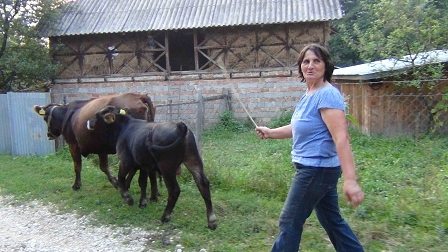
Chris Cummins
I found that immersing myself in this picturesque life meant getting up early. With the sun still low and the mountain air bitingly cold, I followed Ion's wife Adreana into a darkened shed to milk her cows Solbita and Valeono by hand. After washing the cows udders with water and a cloth, and placing a small blue stool by the patient cows’ flanks she showed me how to tug firmly on the teats and squeezing until a firm jet of milk spurted out into a red bucket, foaming and steaming in the post-dawn cold.
After leaving enough milk for Valeono’s calf Buyor to suckle on, we herded the trio up a gravel track to their pastures above the village, a meandering walk through plum orchards and fields of wild lilac that were still wet with the morning dew.
Later Ion taught me how to use a scythe. He swung it with an apparently effortless rhythm. But the ease was deceptive. Ten minutes left me feeling exhausted. Every half hour we had to stop and hammer the blade then grind it against a whetstone to maintain its sharpness.
Later I fought through the jungle of stalks to pick corn by hand. At the end of the day I was dusty and sweaty and very hungry.
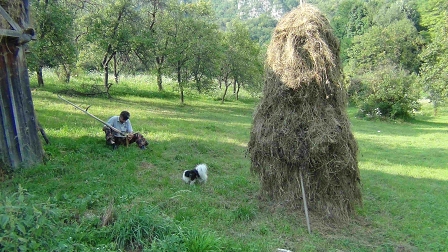
Chris Cummins
Yet this is only part of Ion Ungareanu's daily routine. On week-days he holds down a job as a teacher at the village primary school. When he has time he goes hunting in the wild forested mountains that look over the village. Before going to bed, we chopped wood to heat the boiler for the warm water to shower.
A Countryside Alive With Noises
Around 30% of Romania's 19 million population continues to live off their subsistence and semi-subsistence farms. The countryside is still alive with noises and activities – the whistles of shepherds, the sweep and chatter of reapers; the squawks of the free running chickens on dusty streets.
But, despite the picturesque setting, this story is not about rose-tinted nostalgia. These communities want, need and deserve economic development.
It is about whether a middle way is possible. Can the old ways be adapted to the modern world? Can farmers have a more prosperous life without throwing out their rich culture? And are their values and philosophies still alive that could help us forge a more healthy agricultural policy across the whole of Europe.
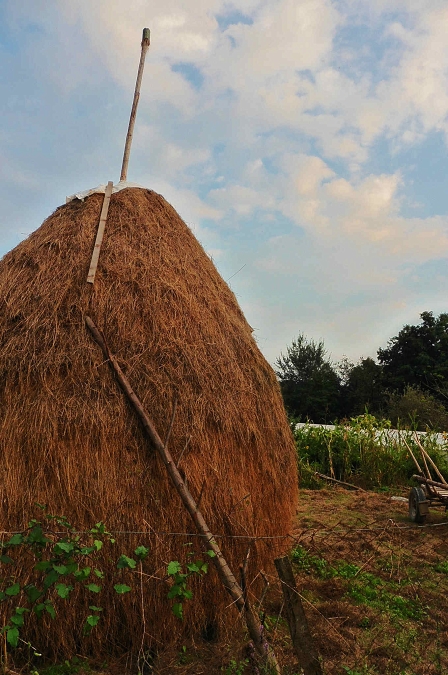
Chris Cummins
I’d been sent to Costesti by Gabriela Mindru, who runs Village Life, a network of rural homestays. “The idea is to allow you to immerse yourself in the life on a rural village,” she told me. “It’s a way to learn a self-reliant lifestyle and connection with nature that has been lost in much of Europe.”
This world is under threat from the lure of commercialism, new EU regulations demanding conformity rather than diversity and agressive advertising campaigns for pesticides.
"Unlike western Europe's countryside, which has succumbed to industrialisation a long time ago, much of the Romanian village is still at a crossroads of development," Gabriela told me. "The tendency now seems to be economic growth without scruples, large investments that do not take into consideration culture and environment."
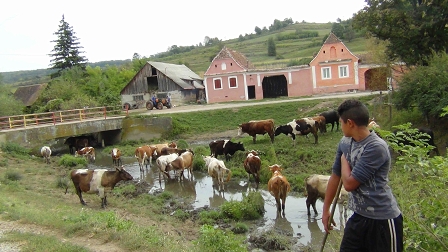
Chris Cummins
Luke Dale-Harris estimates that at present 51% of the €6bn yearly subsidies coming into Romania go to just 0.9% of farms. "The vast majority of Romania's farmers," he says, "are being cast to the sidelines." He says that until Romania focuses funds towards rural development and sustainable agriculture "it threatens its own culture, environment and the largest part of its population."
Small-scale farmers also complain about EU rules regulating farming practices and hygiene. There have been clashes about the issue of small-scale cheese production using the traditional wooden barrels. As the BBC's Nick Thorpe puts it:
"The system seems tilted, as ever, to factory production, supplying spotless, sanitized supermarkets with identical items."
David Vs. Goliath
Over the past decade, reports The Guardian, almost 1 million hectares of Romania's land have been bought up by foreign companies. The fight for traditional grazing rights is gradually taking the shape of a David vs Goliath battle and many feel the EU is on Goliath's side.
Willi Schuster, an organic farmer in the village of Mosna, Transylvania complained to me that the problem for Romania is "that around 90% of farmers have no benefit from the Common Agricultural Policy because they are under the radar."
He says that despite talk of "greening" the Common Agricultural Policy, the EU is hindering rather than helping his fellow small-scale farmers.
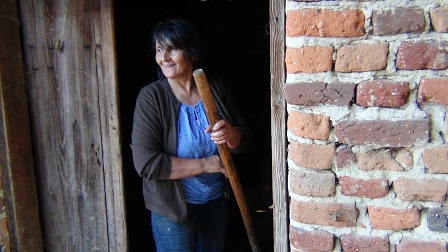
Chris Cummins
Natural Process?
Is it realistic to expect Romania or the EU to support such small-scale farming culture or is this just a painfully but necessary transition phase - the "the natural solution" as one government official has called it?
Before headed to Costesti, I'd spent some time in a village called Hosman in Transylvania. I met a German-called Jochen Cotaru who has settled in rural Romania and hoped to reinvigorate a self-reliant culture he throughly admires but he is a realist:
"When we come here from more Western countries we see a delay of the same developments we already had in Western Europe. My parents and grandparents generations were happy to leave the countryside. They were happy to leave all the dirt and hard work behind."

Chris Cummins
No Romantic Idyll
Jochen's friend Cristian Cismaru urged me to look at the lined faces of the farmers of Hosman: That’s from the hours in the sun in the fields. Look at their calloused hands. It looks romantic but it is very hard work." Pia Brodtrager, a young Austrian living in the nearby village of Viisoara told me locals had spoken to her of their desire for “more luxury and development. A woman in this village doesn’t have a bathroom. They always have to wash outside. It’s beautiful here but I can always go home to my luxury. These people can’t.”
The Middle Way
Gabriela Mindru of Village Life says the key is finding a sensible, social, green way for the rural communities to moving forward without sacrificing their culture or the quality of their produce.
"There is an urgent need to improve the generally low standard of living in the Romanian countryside," she says, “but we think that this is a valuable lifestyle that people could keep up if they have enough resources to continue."
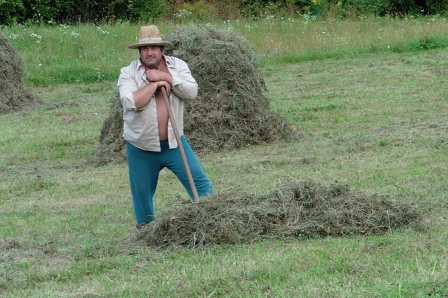
Chris Cummins
By promoting agritourism homestays - I paid a paltry 40 euros for my experience on the Ungareanu's farm - Village Life helps inject some extra revenue into communities. Romanian environmentalist Ioanna Maria argues that it also helps restore pride in rural culture. For years the communists tried to tell rural Romanians their lifestyle was backward and modern materialism has led to a further crisis of confidence in their values:
"Rural Romanians have been taught that everything they they do in the countryside is wrong. When many rural kids come to the city for highschool they often completely do away with everything that they have been brought up with. So I think it would be great if more people would come and basically encourage these people to maintain their way of life."
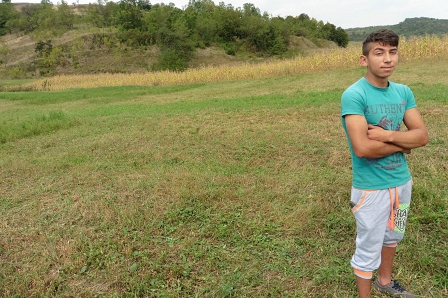
Chris Cummins
Gabriela Mindru says that Village Life is not about dissuading anyone from pursuing other ways of living. She says it is about providing options for those who do want to stay. Europe should be about a one-size-fits-all style of agriculture or a one-size-fits-all model of economic development.
To understand this dynamic I went to the village of Saschiz to meet small-scale producer Anca Dalmasso at her small farm Casa de pe Deal. She is one of the younger generation who has stayed. She supports her rural lifestyle by marketing quality homemade regional products named after her farm.
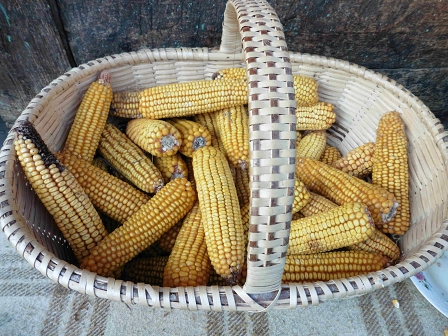
Chris Cummins
Anca insists that the EU’s influence on rural Romania hasn't been wholly negative. She points out that beekeepers, for example, have received EU funding to carry on their old trade. And she says, thanks to the outgoing EU Agriculture Commissioner Dacian Cioloş, young people have received financial encouragement to stay in agriculture.
“I strongly believe we were very lucky because the Commissioner of Agriculture was a Romanian. Now it will be a challenge. Let’s hope the next Commissioner will have the same concerns about the greening of the new agricultural policy and the same respect for the small producers."
Again, she says, the key is finding a balance. "We are not fighting against something, we do understand that we have to have a little bit of everything. What we are asking is just that we are left able to exist and leave the choice with the consumer.”
A Matter Of Taste
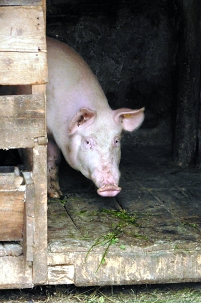
Chris Cummins
Perhaps the taste that comes from this form of agriculture is the best argument as to why this battle of values on the edge of Europe really matters. It is about our relationship with the food we eat.
Every evening at the Ungreanu's - sitting on a bed that serves as seating in the humble living room, we feasted on garden-grown tomatoes that aromatic and juicy, on the cheese, bartered in the village, that is pungently delicious and the succulent meat from one of the Ungareanus' own chickens.
This is what food is about - something to be cherished and enjoyed together. It's not merely fuel, to be broken down into nutritional values and consumed on the trot. As you see through the appeal for organic food and slow cooking, the rise in WWOOFing holidays the appetite for these values still exists in western Europe.
This is a vital crossroads.
The current government is apparently in favour of both GMO cultivation and intensive farming. Soon Romania might be just like any other European country. Organic farmer Willi Schuster has viewed the trends since EU accession with dismay: “Lots of chemicals invaded Romania and we also realised that the small-scale farmers are under a big threat of being swept away by these developments led by the huge corporations.”
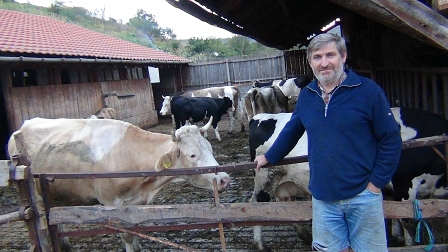
Chris Cummins
And that could have a negative impact on certain products. In autumn, the hills of Romania are strewn with purple and blue wild-flowers and nomadic beekeepers move their colourful box hives around the country. The honey produced by small-scale farmers here wins prizes and Anca thinks she knows why:
“I think it is the biodiversity – the fact that we still have such a variety of flowers. You know the quality of honey comes from the quality of the flowers. That’s the secret. Keep the biodiversity and you have good quality products.”
Dieses Element ist nicht mehr verfügbar


